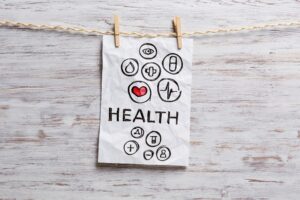Health Myths Busted: 12 Things You Thought Were Bad for You But Aren’t

In the age of instant information, distinguishing between fact and fiction can be challenging, especially when it comes to our health. Many beliefs we’ve held for years about what’s harmful to our well-being are now being debunked by scientific research. Here’s a look at 12 common health myths that may surprise you.
1. Eating Eggs Raises Your Cholesterol Levels

For years, eggs were villainized for their high cholesterol content, feared to spike blood cholesterol levels. However, recent studies have shown that eggs minimally affect blood cholesterol for most people and are a nutritious source of high-quality protein and vital nutrients like vitamin D and choline. Including eggs in your diet, in moderation, can be a part of a healthy eating plan.
2. Cracking Your Knuckles Leads to Arthritis

The unsettling sound of knuckle cracking has led many to believe it could cause arthritis. Yet, scientific evidence does not support this theory. The sound comes from gas bubbles bursting in the synovial fluid surrounding your joints, not from bones grinding. While habitual cracking isn’t harmful, it’s wise to avoid forceful or excessive manipulation, which could cause injury.
3. You Must Drink Eight Glasses of Water Daily

While staying hydrated is essential for health, the eight-glasses-a-day rule is not a one-size-fits-all requirement. Individual needs vary based on factors like activity level, climate, and overall health. Listening to your body and drinking when thirsty, as well as consuming fluids through water-rich foods, can adequately meet your hydration needs.
4. Microwave Ovens Make Food Radioactive

Microwaves have gotten a bad rap for supposedly zapping food with dangerous radiation. However, microwaves simply use electromagnetic radiation to heat water molecules in food. This process does not make the food radioactive, nor does it significantly diminish its nutritional value. Using microwaves is a quick, safe, and convenient cooking method.
5. Skipping Breakfast Is Bad for You

“Breakfast is the most important meal of the day” is a mantra many of us have grown up with. However, recent studies suggest that skipping breakfast might not necessarily be bad for everyone. Intermittent fasting and personal dietary rhythms mean that for some, waiting until later in the day to eat could contribute to better health outcomes.
6. Chocolate Causes Acne

The myth that chocolate leads to acne has caused unnecessary guilt for countless sweet tooths. Research has not found a direct link between chocolate and acne. Factors like hormonal changes and bacteria are more significant contributors to acne. However, maintaining a balanced diet is still essential for skin health and overall well-being.
7. Sitting Close to the TV Damages Your Eyes

Parents worldwide have warned their children not to sit too close to the TV, claiming it would harm their eyesight. Modern screens, however, emit much less harmful emissions than older models. While sitting too close might cause eye strain or fatigue, it doesn’t cause permanent eye damage. Ensuring regular breaks and practicing good screen hygiene are more critical.
8. Eating Carrots Improves Night Vision

Carrots, rich in beta-carotene (which the body converts to vitamin A), are good for overall eye health, but don’t expect superhero night vision. This myth originated from a World War II propaganda campaign. A balanced diet is key to maintaining healthy vision, but no single food can offer night vision capabilities.
9. Swallowed Gum Stays in Your Stomach for Years

The idea that swallowed gum remains in your stomach for seven years is a myth. While gum doesn’t digest in the stomach, it passes through the digestive system relatively intact and exits the body during bowel movements. Swallowing gum occasionally is harmless, though it’s not recommended as a habit.
10. Cold Weather Causes Colds

The common cold is caused by viruses, not cold weather itself. People may be more susceptible to getting sick in colder months due to spending more time indoors, where viruses spread more easily. Dressing warmly and practicing good hygiene are the best defenses against cold viruses, regardless of the weather.
11. Sugar Makes Children Hyperactive

The belief that sugar causes hyperactivity in children is widespread, yet research does not support this. Studies have shown no difference in behavior between children who consume sugar and those who do not. Factors like environments and occasions that typically involve high sugar intake (parties, holidays) may be more influential in changing children’s behavior.
12. You Lose Most of Your Body Heat Through Your Head

The myth that we lose 70-80% of our body heat through our heads is an overstatement. While it’s essential to wear a hat in cold weather to prevent heat loss, the amount of heat lost depends on how much skin is exposed, not just the head. Dressing warmly and covering exposed skin in cold temperatures is the best approach.
Watch Out for Health Myths

Ultimately, it’s crucial to approach health myths with skepticism and to seek evidence-based information. By debunking these common misconceptions, we can make more informed decisions about our health and well-being. Stay curious, and don’t let myths dictate your health choices.
Read More:
12 Unexpected Health Benefits of Gardening That Go Beyond Fresh Produce
14 Extraordinary Medical Conditions Challenging Our Understanding of Human Health